About allergy treatment

Why is allergy treatment important?
Allergic symptoms, sudden onset of runny nose, and sneezing in fits are extremely unpleasant. Nasal congestion at night causes sleep disturbances, the person cannot relax, wakes up tired, and is even tired all day. If allergic rhinitis is not treated, the process progresses to the lower airways, bronchi, and lungs, causing coughing and difficulty breathing. As a result of the treatment, the patient's quality of life improves, disturbing symptoms decrease or may even disappear.
What prevention and avoidance options exist?
The first step in the treatment of allergy patients is to avoid the allergenic plants that cause symptoms as much as possible during the critical period. What are the ways to do this?
- Stay outdoors as little as possible on dry, hot, windy days. Avoid outdoor sports, cycling and hiking in such weather.
- In general, it is advisable to entrust mowing and weeding to their non-allergic companions.
- It is recommended to ventilate the apartment between 10:00 p.m. and 4:00 a.m., as there is the least amount of pollen in the air at that time.
- Use an air conditioner and pollen filter in the apartment and in the car.
- Do not dry clothes outdoors.
- They wash their hair often, because pollen that gets into the hair during the day can cause complaints at night.
- After a heavy rain, the amount of pollen in the air decreases, so they can stay outdoors more bravely.
- It is advisable to plan your vacation in a place where there is little allergenic pollen in the air (beach, high mountains).
- People with pollen allergies may have complaints due to the consumption of certain fruits and vegetables, similar particles in the structure of pollen and food (we will write about this in detail below).
Treatment options for allergy symptoms
Symptoms can be reduced with appropriate medication. Anti-allergy medicines (antihistamines) come in tablet, syrup and solution form. In addition to medications, it is recommended to wash the nasal mucosa daily with physiological saline, this helps to remove allergens. Using nasal sprays that reduce inflammation of the nasal mucosa can reduce runny nose and nasal congestion.
If we cannot achieve symptom relief with drug treatment, then immunotherapy comes into question, which is the only treatment for the cause.
- During immunotherapy, a purified extract of the allergens causing the symptoms is first introduced into the body of the allergic individual in small and then increasing doses. In the case of a small dose, the immune system begins to produce antibodies, and by gradually producing them in larger quantities, the body becomes able to neutralize the effect of the given allergen. This reduces or even eliminates allergy symptoms. The treatment usually lasts for 3 years, during which period the symptoms gradually weaken, the quality of life improves and the consumption of medication decreases, even after a while anti-allergy medications become unnecessary.
- An improvement of 20-30% is usually expected in the first year of therapy, 50-60% in the second year, and 70-80% in the third year, but even complete relief of complaints and symptoms may develop.
- Immunotherapy can be administered as an injection, sublingual drop, or tablet. The injection can only be given in hospital conditions, sublingual preparations can be used at home.
- For pollen allergies, immunotherapy can be given against the following plants: ragweed, weeds, grass mixtures, cereals, trees and shrubs.
What are the risks and potential harmful effects of not taking treatment?
In the absence of treatment, the sudden onset of a runny nose (ouch, my nose is dripping!), sneezing in fits is unpleasant and very disturbing in everyday life.
Nasal congestion at night causes sleep disturbances, the person cannot relax, wakes up tired, and his ability to concentrate during the day decreases, he becomes tired and depressed.
If we do not treat the upper respiratory tract symptoms, the process continues towards the lower respiratory tracts, triggering symptoms typical of asthma, causing coughing and breathing difficulties.
Prolonged symptoms create permanent changes, as a result of prolonged coughing and suffocation, a lack of oxygen occurs, the elastic smooth muscle fibers are transformed into inelastic fibers, they thicken, the expansion of the lungs decreases, and thus the physical load capacity decreases.
Chronic inflammation of the mucous membrane can even lead to the formation of nasal polyps, which can damage the sense of smell and make it difficult to breathe through the nose, and may require a surgical solution in the long term. An untreated allergic person becomes more susceptible to viral and bacterial respiratory infections.
If you want to make an appointment for a pulmonary specialist examination, you can do so via our telephone customer service at +36 1 790 7070 or online!
Get to know our pediatric pulmonologist:
